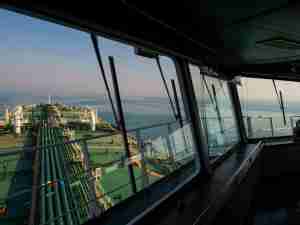Med Crude-Urals rise in south as June cargoes become scarce
By: Reuters | Jun 16 2014 at 12:58 PM
Russian medium sour Urals firmed in the south on Monday as June availabilities dry up and on the expectation that the July programme will be on the short side from the Black Sea.
In the Platts window, Tenergy sold an 80,000 tonne Urals cargo to Litasco at dated Brent minus $1.65 cif Augusta loading June 27 to July 1.
Traders said it was too early to tell if the market would stay strong after rising 40 cents a barrel compared to the last session.
The Urals crack is still very weak with the 5-day average at minus $1.60 a barrel and the 15-average at minus 22 cents a barrel, according to Reuters data.
Russia could boost crude exports by as much as 600,000 tonnes or six cargoes in July versus June following a major accident at the Achinsk refinery over the weekend, market sources said on Monday.
The Northwest Europe Urals swaps market edged lower on Monday following the explosion, ending the day at a bid/offer spread of minus $2.10 to minus $1.95 a barrel, after ending Friday at around minus $1.85 a barrel.
So far, from June 30 until July 4, Urals exports from Primorsk have been set for 500,000 tonnes and from Ust-Luga at 400,000 tonnes, a preliminary schedule showed.
In the south, Urals exports for July 1-5 have been set at 300,000 tonnes from Novorossiisk so far.
The Kurdistan Regional Government believes its share of total Iraqi oil sales should be as high as 25 percent, the KRG’s official spokesman said on Monday.
It argues budget cuts from Baghdad had driven it to pursue independent oil sales outside the federal government’s control.
Meanwhile, the Islamic insurgency continued with the capture of another town north of Baghdad.
The United States said it could launch air strikes and act jointly with its arch-enemy Iran to support the Iraqi government, after a rampage by Sunni Islamist insurgents across Iraq that has scrambled alliances in the Middle East.
Militants from the Islamic State of Iraq and the Levant have routed Baghdad’s army and seized the north of the country in the past week, threatening to dismember Iraq and unleash all-out sectarian warfare with no regard for national borders.
Some Libyan exports could restart in the west after one of the major oilfields resumed output after a lengthy shutdown by protests.
Libya’s western El Feel oilfield restarted production after security guards ended a protest that lasted more than two months, oil ministry officials said on Sunday, but many oilfields and ports remain blocked.
But the eastern Hariga oil export port remained blocked by state security guards who were said they had not been paid for months.
A spokesman for state-oil firm AGOCO, which runs the port and connecting oilfields, said the finance ministry had paid the salaries but the firm was still waiting for the guards to confirm their protest was over.








